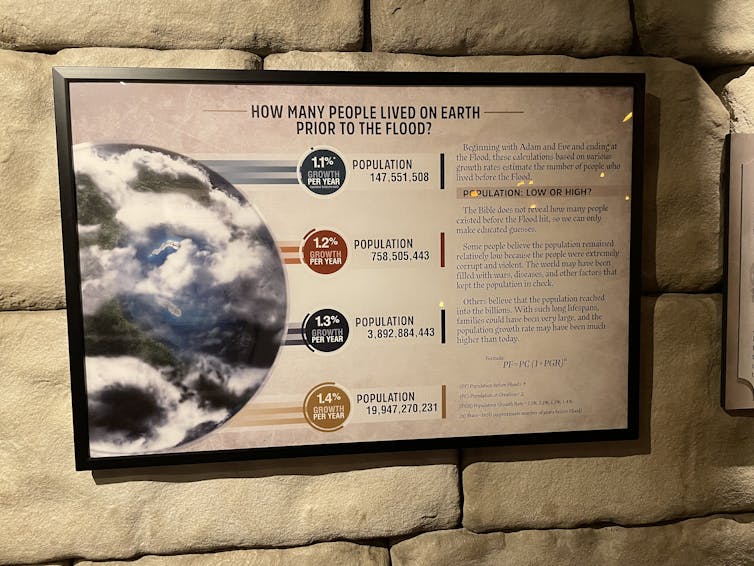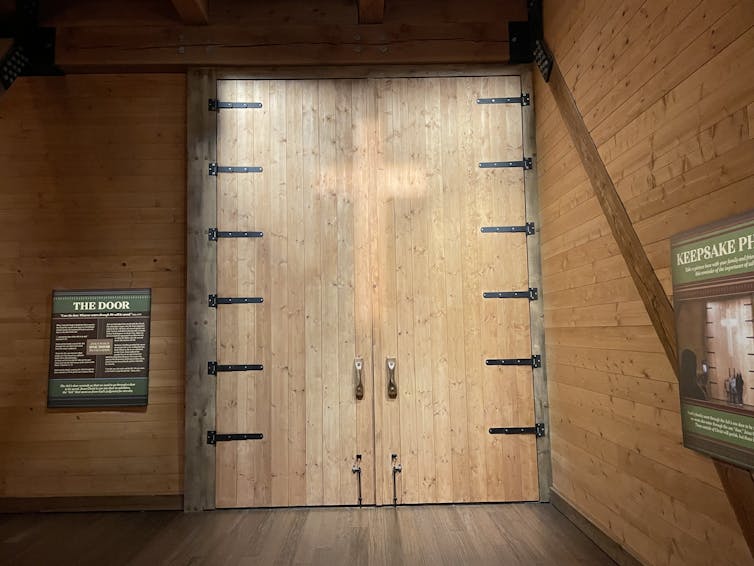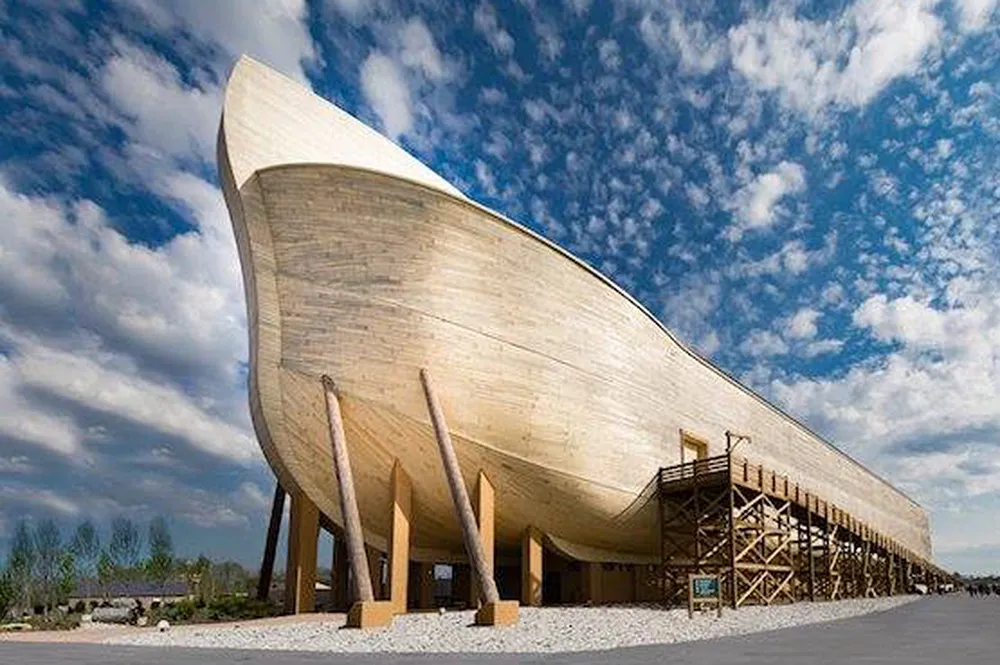The Ark Encounter, an evangelical theme park located near Williamstown, Kentucky, has welcomed between 4 million and 5 million visitors since its opening in July 2016. Hundreds of thousands more are sure to visit this summer.
This theme park boasts a re-creation of the story of Noah’s Ark from the Bible. As described in Genesis 6:14-16, God directed Noah to build this ark to spare eight humans and a male and female pair of every kind of creature from the flood that God was going to unleash on the world as a punishment for sin.
As scholars of fundamentalism and creationism, we have visited the Ark Encounter multiple times. We have also written a book, “Righting America at the Creation Museum,” about the ark’s companion site, the Creation Museum in Petersburg, Kentucky.
What we find particularly striking about Ark Encounter is that it is a tourist site devoted to emphasizing – with great specificity – the wrathful nature of God and the eternal damnation that awaits unrepentant sinners.
What is Ark Encounter’s argument?
According to Answers in Genesis, the fundamentalist organization that launched Ark Encounter, and its CEO, Ken Ham, Ark Encounter is a centerpiece of AiG’s mission to “expose the bankruptcy of evolutionary ideas and bedfellow: a ‘millions of years old’ earth (and even older universe).”
So, according to AiG, when Genesis 1 says God created the Earth in six days, it literally means six 24-hour days. Similarly, when the Bible says Adam and Eve were created on the sixth day and gives details about their descendants and how long they lived, this is interpreted as recounting real history. And all of this means that, according to AiG, the Earth is “about 6,000 years old.”
While scientists have estimated the Earth to be about 4.5 billion years old, AiG counters by claiming that radiometric dating is not reliable. Instead, they assert that the catastrophic biblical flood created all the geological formations that make the Earth look ancient.
Over the past few decades, this argument has become a doctrinal touchstone for many American evangelicals.
An enormous structure
We most recently visited the Ark Encounter on March 15, 2022. Measuring 510 feet (155 metres) long, 85 feet (25 metres) wide, and 51 feet (15 metres) high, the Ark Encounter is, to quote one visitor we overheard, “so huge!”
After purchasing tickets that cost US$54.95 per adult, we and other visitors boarded buses and made the ascent up a long hill. Getting off the bus, we walked to the Ark, keenly aware of how small we were in relation to this ginormous structure.
Inside the Ark, visitors walk through three enormous decks, encountering rows of clay food storage containers, burlap sacks and animal cages. They observe over 100 bays featuring placards and digital animations that, among other things, go far beyond the Bible to explain Noah’s training in shipbuilding, carpentry and blacksmithing. The same creativity applies to the various displays explaining how eight human beings on the Ark fed, watered, and managed the waste of 7,000 or so creatures.

Visitors also walk through a life-size diorama of the plush living quarters of Noah’s family, where they learn about the skills, gifts, and interests of Noah’s sons – details not included in Genesis. They also learn about Noah’s wife and his sons’ wives. The Bible never identifies these women by name, much less describes them. Nevertheless, the Ark gives them names, different ethnic complexions, biographies, and even hobbies.
Notwithstanding the occasional placard acknowledging that designers have taken “artistic license” with these dioramas, we couldn’t help but notice how much of what is in the Ark is not actually found in the Bible.
But visitors to the Ark seem to embrace these dramatic additions to the biblical text. As religion scholar Paul Thomas observes in his new book, “Storytelling the Bible at the Creation Museum, Ark Encounter, and the Museum of the Bible,” the world created by the designers of the Creation Museum and Ark Encounter satisfies the evangelical longing “for a time and place governed by biblical principles, even if that idealized time and place … never really existed.”
A very angry God
AiG requires all Ark Encounter employees to affirm a 46-point faith statement. They must agree, for example, that “gender and biological sex are equivalent and cannot be separated,” modern understandings of “social justice” are “anti-biblical,” and all humans “are sinners” and “are therefore subject to God’s wrath and condemnation.”
This emphasis on the overwhelming wrath of God is perhaps the most noteworthy feature of Ark Encounter as a tourist site.

Genesis 7:16 states that, as the flood waters rose, God slammed shut the door into the Ark. Once shut, all the humans and animals on the other side of the door were doomed to drown.
According to a placard displayed at Ark Encounter, there may have been upwards of 20 billion people on Earth at the time of the Genesis flood, a number that would have included children and infants, not to mention the unborn.
Another placard asks, “Was it just for God to judge the whole world?” The answer: “Since He is the one who gave life, He has the right to take life. Secondly, God is perfectly just and must judge sin. Third, all have sinned and deserve death and judgment.”

Remarkably, Ark Encounter has placed a “keepsake photo” placard near the door that, in the Ark’s depiction, sealed the fate of all those on the other side. As we have witnessed every time we have toured Ark Encounter, happy visitors line up to have their photos taken in front of this door.
According to AiG, this ancient divine slaughter prefigures a future divine slaughter. As the Ark Encounter website puts it, “God will judge this wicked world once again, but this time it will be by fire … God always keeps His promises – judgment will come.” According to AiG, we can escape this fate by believing in Christ, but for the billions (past and present) who have not or do not, the result is “everlasting, conscious punishment in the lake of fire (hell).”
As historian Doug Frank makes clear in his 1986 book, “A Gentler God,” this understanding of a wrathful God is alive and well in American evangelicalism. Frank’s argument is supported by a 2014 Pew Research report that revealed that 82% of American evangelicals believe in a literal hell.
Millions of evangelicals visit Ark Encounter for all sorts of reasons, including, perhaps, its sheer immensity. That said, the message they get from Ark Encounter is clear and simple.
The wrathful God has determined that those who do not accept Jesus as savior, those who are resolutely on the wrong side of culture war issues like abortion and LGBTQ+ rights, will pay for their sin eternally.
--30--
Written by Susan L Trollinger, Professor of English, University of Dayton and William Trollinger, Professor of History, University of Dayton
This article is republished from The Conversation under a Creative Commons license. Read the original article.







